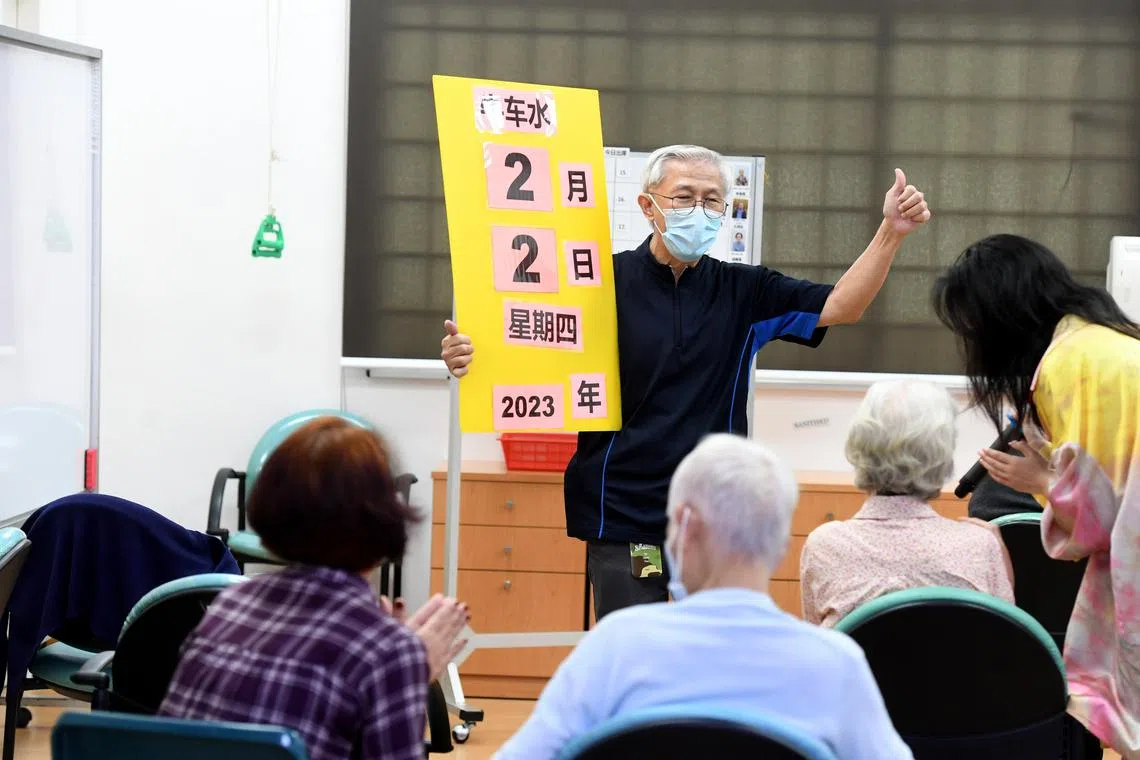The true cost of dementia: It can set a family back by up to $1.6m over 10 years
Sign up now: Get ST's newsletters delivered to your inbox

Dementia victims suffer a gradual deterioration until they lose all mental capacity.
PHOTO: ST FILE
Follow topic:
SINGAPORE – Dementia is an exceptionally distressing health crisis when it hits an individual and their family but almost as damaging can be the severe financial pain it brings.
Dementia victims suffer a gradual deterioration until they lose all mental capacity. They are unable to think and reason, remember new information or recall past events, solve problems or take care of themselves.
That also means they cannot work, so income is lost. And an urgent need arises for someone to take care of them, and that is when their loved ones can find themselves under severe pressure.
Financial advisory firm SingCapital did a projection for Invest assuming three scenarios: A spouse quits his or her job to take care of the patient; a domestic helper is engaged; and the patient is admitted to a nursing home.
Its findings will shock many: Dementia can set a family back by up to $1.6 million in expenses if the individual survives for 10 years. That works out to monthly outlays of as much as $13,600.
The huge financial impact of the disease
Ms Lorna Tan, head of financial planning literacy at DBS Bank, says we could first consolidate information such as savings, investments and insurance policies to get a clearer picture of our financial position. This lets us see where our portfolio falls short so we can decide how much to set aside for long-term care protection, how much for other types of insurance and investments and how much more we need to save.
Some financial advisers say planning for dementia and retirement can go hand in hand.
Mr Willis Lau, a financial planner with Great Eastern, notes that when people plan for retirement, they think only about what they want to do when they quit work, such as go travelling.
But people seldom consider that life may not turn out the way they wish as they could fall ill or get dementia.
Mr Lau says the money earmarked for enjoyment in retirement can help pay for care expenses if the individual gets dementia later.
Dementia is more common among those over 65 but global data in recent years has shown a rising trend of young onset dementia, which hits any time from age 30.
Ms Tan says people can consider shoring up their insurance coverage for dementia as soon as they start working.
The Government launched two long-term care schemes in 2020 – CareShield Life and MediSave Care – to provide basic financial support for those who become severely disabled.
Ms Tan says CareShield Life pays $600 a month while MediSave Care allows a withdrawal of up to $200 a month if the individual’s MediSave balance in his Central Provident Fund account remains above $20,000.
So a person could get up to $800 a month in total – but that is a paltry amount in the face of rising healthcare costs.
Department of Statistics data shows healthcare costs rose 4.3 per cent in the first six months of the year over the same period in 2022. It also shows that these costs have been trending up, rising 1.1 per cent in 2021 and 2.2 per cent in 2022.
Ms Tan says an individual could get a CareShield Life supplementary plan from the three approved insurers – Singlife, Great Eastern and Income.
The premiums for the supplement plan can be paid by cash, or the individual’s or his family member’s MediSave account, up to a limit of $600 a year per person.
Ms Tan says that with a supplement, the individual receives a payout when he cannot fulfil one or two out of six activities of daily living (ADLs), as opposed to three ADLs, which is the criteria for the basic CareShield Life.
The six ADLs are bathing, wearing your clothes, eating on your own, going to the toilet, walking or moving about, and moving from a bed to an upright chair.
The supplements can lift the payout to $5,000 a month, Ms Tan adds, depending on the premiums and the severity of the disability.
Mr Alfred Chia, chief executive of financial advisory firm SingCapital, notes that the yearly premiums for CareShield Life supplements do not go up with age, so if the individual buys the supplementary plan at 30, the premiums will be fixed then.
“Do it when you are young. Now that you can buy at 30 years old, do so,” he adds.
Your premiums are cheaper because you are young, he says, noting that it is not like the hospitalisation plans where premiums rise as you age.
Mr Chia says everyone should review their insurance policies which pay out on total permanent disability (TPD), especially if they had bought them 15 to 20 years ago.
It is difficult to make any claims on the old TPD policies, he adds, because the criteria – “total and irrecoverable loss of sight of both eyes” or “irrecoverable loss of use of both limbs” – are strict.
Mr Chia says reforms introduced about 10 years ago made the criteria less strict: As long as the individual cannot perform any three of the six ADLs, he will be able to claim for dementia.
Great Eastern’s Mr Lau says people who have coverage for critical illness can consider claiming payouts under their policies for these as well.
Alzheimer’s disease/severe dementia is one of the 37 critical illnesses, notes the Life Insurance Association.
Being financially prepared is all well and good, but it will be difficult and time-consuming to execute any well-thought-out financial plan if a person did not make his lasting power of attorney (LPA).
The LPA is a legal document that allows a person who is at least 21 to voluntarily appoint one or more people (donees) to make decisions and act on their behalf if they lose mental capacity.
Donees can be appointed to take care of a person’s personal welfare and manage his property and other financial affairs.
There are two LPA forms. Form 1 grants donees general powers with basic restrictions and can be done online on the Office of the Public Guardian website. The second form bestows on donees customised and specific powers and needs to be drafted by a lawyer.
Ms Tan says an LPA prevents a person’s family from being caught in unnecessary, lengthy and costly court proceedings to apply for deputyship to manage his personal and financial affairs.
“An LPA can prevent families from being locked out of bank accounts, insurance proceeds and assets when they need them most,” she adds.
Lawyer Chong Yue-En from Bethel Chambers says people must think carefully about the person they want to appoint as their donees because there are no checks and balances on them; they do not have to report to anybody on how they use the money.
“There are donees who run away with the money or spend it on themselves,” he adds.
He also advises everyone to also do an advanced care plan when they make their LPAs.
These plans spell out how the person wants to be medically treated and cared if he loses mental capacity.


